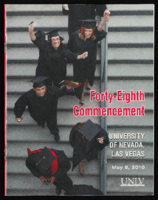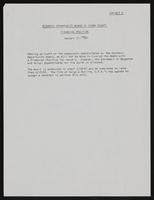Search the Special Collections and Archives Portal
Search Results

Transcript of interview with Jack W. Zunino by Stefani Evans and Claytee White, August 30, 2016
Date
Archival Collection
Description
Landscape architect Jack W. Zunino is a Fellow of the American Society of Landscape Architects (ASLA) and president of the Society's local chapter. He has designed many of Southern Nevada's iconic landscapes: the Rio Hotel, the M Resort, the Desert Demonstration Gardens, the gardens at Ethel M. Chocolates, the Cactus Avenue overpass, and most notably, the Springs Preserve. He's also a third-generation Nevadan from Elko, grandson of Italian immigrants who met and married in the Silver State and raised their large family in that Nevada mining town. The product of Elko schools, he graduated from the University of Utah in psychology and Utah State University in landscape architecture while earning his tuition as a road construction laborer. In this interview, Zunino tells of his employment with G.C. Wallace Engineering and JMA architects before founding his own landscape architecture firm in 1989. He speaks to the importance of planners and landscape architects on Southern Nevada's conser
Text

University of Nevada, Las Vegas (UNLV) 48th commencement program
Date
Archival Collection
Description
Commencement program from University of Nevada, Las Vegas Commencement Programs and Graduation Lists (UA-00115).
Text

Economic Opportunity Board of Clark County (Nev.) financial and budget reports
Date
Archival Collection
Description
From the Clark County Economic Opportunity Board Records -- Series I. Administrative. This folder contains financial memos and reports of the Clark County Economic Opportunity Board in 1967.
Text

Chet Buchanan oral history interview: transcript
Date
Archival Collection
Description
Oral history interview with Chet Buchanan conducted by Barbara Tabach on November 28, 2017 for the Remembering 1 October Oral History Project. Chet Buchanan begins this interview with a discussion of his move to Las Vegas, Nevada in 1999 after he was offered a job as a radio show host for 98.5 KLUC. He talks about the specifics of his job, including his career background as well as the Chet Buchanan Toy Drive. For this interview, he specifically goes into detail on his coverage of the Las Vegas October 2017 mass shooting and discusses being in San Diego, California at the time, yet still striving to reach people through his broadcast with the help of CBS San Diego. Throughout the interview, Buchanan examines his desire to make a difference in the community with his show and his interactions with the public.
Text
Tamika Shauntee (American Civil Liberties Union) oral history interview conducted by Kelliann Beavers and Elia Del Carmen Solano-Patricio: transcript
Date
Archival Collection
Description
From the Lincy Institute "Perspectives from the COVID-19 Pandemic" Oral History Project (MS-01178) -- Community organization interviews file.
Text

Transcript of interview with Mike, Fred, & John Pinjuv by Barbara Tabach, May 13, 2014
Date
Archival Collection
Description
Mike Pinjuv sired one of Las Vegas’s early families after arriving in 1917. Mike Pinjuv arrived in Las Vegas via the Union Pacific Railroad and brought Ivan Pinjuv and his family to town (although Mike’s sons do not know the familial relation between the two men). Mike and his wife, Frances Malner, raised six sons and two daughters to adulthood through World War 1, the Great Depression, and World War II. The oldest five brothers attended Las Vegas High School, while Fred, the youngest brother, and the two sisters attended Rancho High School. In this interview, their three younger sons recall how they, their parents, and their siblings navigated the social and physical changes in the Las Vegas landscape. Over the near century that the Pinjuv family has lived in Las Vegas its members have contributed to the city in countless ways. In the early years Mike owned a gas station and a grocery store and worked several jobs before going to Nellis Air Force Base as a civilian. Of the Pinjuv sons
Text

Apolonio Sauceda interview, August 13, 2019: transcript
Date
Archival Collection
Description
Interviewed by Barbara Tabach and Monserrath Hernández. Born in 1927 to Mexican immigrant parents, Apolonio spent his youth in the Kansas City, Kansas area. Arrived in Las Vegas and was a map maker for Clark County. Very involved in local Latino community, NALA, Veterans organizations, and was an actor on the side. Subjects: NALA, American Legion, Lt. Colonel in Nevada Color Guard
Text

Transcript of interview with Harold R. Hunter by Philip John Mile, March 19, 1978
Date
Archival Collection
Description
On March 19, 1978, Philip John Mile interviewed former chef, Harold R. Hunter (born 1901 in Norwich, Kansas) about his life in Southern Nevada. Hunter discusses his different experiences working in early Las Vegas restaurants during the thirties and forties. Hunter also discusses the rapid growth of the Mormon community during this time.
Text

Transcript of interview with Lori Chenin-Frankl by Barbara Tabach, June 7, 2016
Date
Archival Collection
Description
Lori provides a wonderful narrative of her Judaism, her love of teaching children and her devotion to family and music. She talks about growing up in Las Vegas and becoming a bat mitzvah, a rarity for girls in 1973. Throughout her life, including the period where she moved around with her Air Force husband, she sought Jewish connections to help her feel at home no matter where she was.
Text

Transcript of interview with Justice Michael Cherry by Barbara Tabach, September 19, 2014
Date
Archival Collection
Description
Interview with Justice Michael Cherry by Barbara Tabach on September 19, 2014. In this interview, Justice Cherry talks about how he came to Las Vegas and his work as a public defender and as a lawyer in private practice. He also discusses his involvement with Jewish organizations in various capacities, and his involvement with high-profile cases such as the MGM Grand and Las Vegas Hilton fires, earning him the nickname "master of disaster."
Justice Michael Cherry was born in St. Louis, Missouri, and went on to spend his childhood in the Jewish neighborhood of University City. He attended University of Missouri and became a leader in his fraternity, Alpha Epsilon Pi, and a committed ROTC cadet. By the time Justice Cherry graduated from Missouri and was heading to Washington University School of Law, he was a second lieutenant; halfway through law school, he was promoted to first lieutenant. It was also during law school that he married his college sweetheart, Rachel Wolfson. When a bad back prevented him from becoming an active air force officer, he and his wife decided to follow his mother to Las Vegas. Justice Cherry worked both as a law clerk with the Public Defender's Office as well as a security guard at Wonder World when he first moved to the city. After passing the Nevada bar, Cherry took at position with the Public Defender's Office, and later went into private practice as a successful criminal defense attorney. Cherry was elected as district judge in 1998 and 2002. In 2006, he won his campaign for state Supreme Court justice. Justice Cherry was reelected to office in 2012 for another four-year term. He is currently the highest-positioned Jewish official in the state of Nevada. Throughout his years in Las Vegas, Justice Cherry has been an extremely active and influential member of the Jewish community and served as chairman of the Anti-Defamation League and is active in the Jewish Federation. Justice Cherry attributes his commitment to service to his mother. In addition to his service to the Jewish community, he has been active in numerous other service organizations, including March of Dimes, Olive Crest, Adoption Exchange and American Cancer Society.
Text
